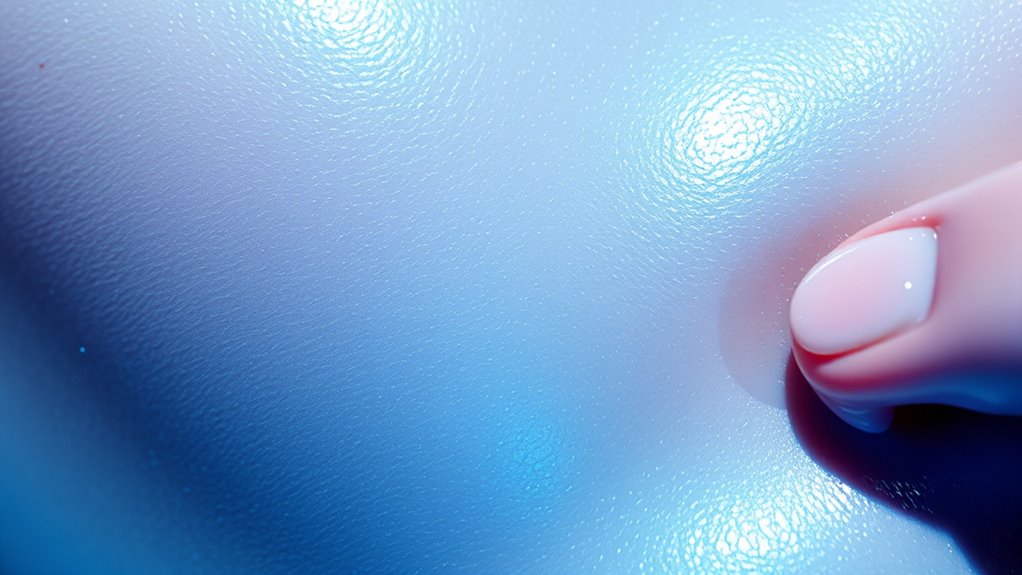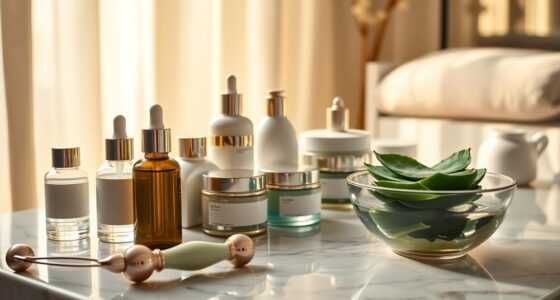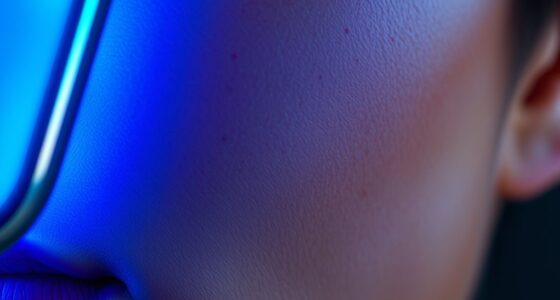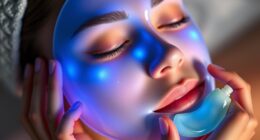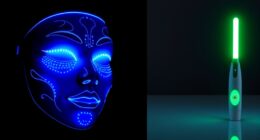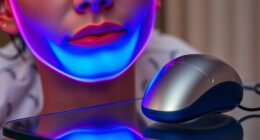Exposure to blue light from screens can increase your skin’s oil production, leading to greasier skin and more breakouts. It also triggers oxidative stress, which speeds up aging signs like wrinkles and dullness, especially if you have oily or acne-prone skin. Over time, blue light can enlarge pores and worsen skin texture. To keep your skin clearer and healthier, it’s important to understand how to protect against these effects — keep exploring to learn more.
Key Takeaways
- Blue light stimulates sebaceous glands, increasing oil production and potentially worsening oily skin.
- Prolonged exposure can cause oxidative stress, accelerating skin aging and enlarging pores.
- Blue light may lead to more breakouts by trapping dirt and bacteria in excess oil.
- Using blue light filters, antioxidant skincare, and protective habits can help mitigate effects.
- Oily skin exposed to blue light may appear shinier, greasier, and prone to uneven texture over time.
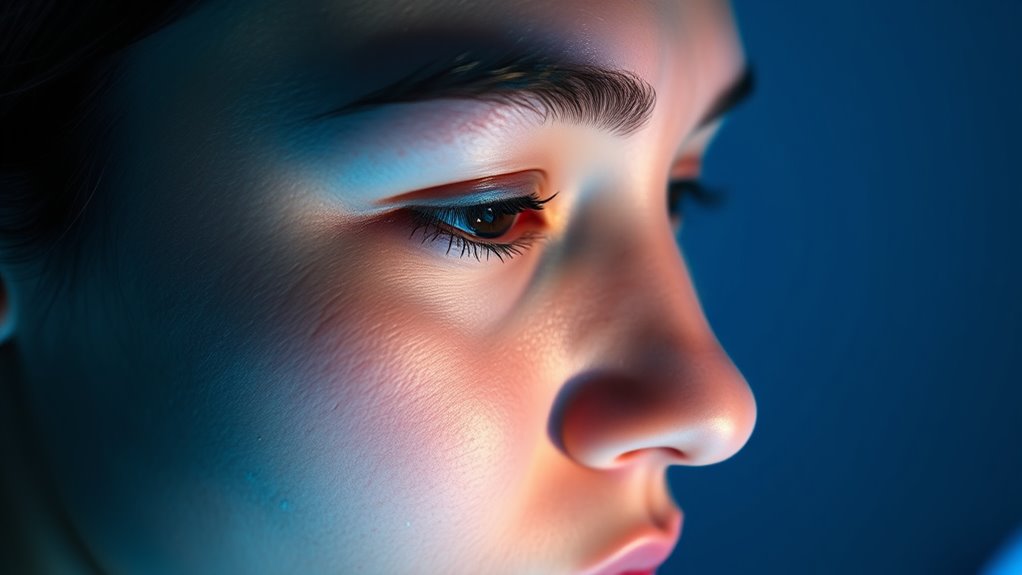
Many people are unaware that exposure to blue light from screens can worsen oily skin. While you might think blue light only affects your sleep or causes eye strain, it also plays a role in skin health. Blue light penetrates deep into your skin layers, triggering reactions that can increase oil production. When your skin is exposed to blue light over time, it can lead to an imbalance in your skin’s natural oils, making your pores look larger and your face shinier. This is especially problematic if you already have oily or acne-prone skin, as it can exacerbate breakouts and make your skin appear greasy throughout the day.
Blue light from screens can increase oil production and worsen oily, acne-prone skin over time.
The primary issue lies in blue light’s ability to stimulate your skin’s sebaceous glands. These glands produce sebum, the oil that keeps your skin lubricated. When blue light triggers an overproduction of sebum, your skin becomes excessively oily. Over time, this excess oil traps dirt, bacteria, and dead skin cells in your pores, creating the perfect environment for acne to develop. You might notice that after prolonged screen time, your skin feels greasier or looks more congested. This isn’t just in your imagination; blue light exposure can directly influence your skin’s oil levels, making managing oily skin even more challenging.
Furthermore, blue light can cause oxidative stress in your skin cells. This stress damages the cells and accelerates the breakdown of collagen and elastin, which are vital for maintaining skin firmness and elasticity. As your skin ages faster due to this damage, it becomes more prone to enlarged pores and dullness, compounding issues related to oiliness. The combination of increased oil production and skin damage can make your oily skin appear worse over time, despite your efforts with skincare products. Recognizing the effect of blue light on skin aging can help you better understand the importance of protective measures.
To protect yourself, you should consider limiting screen time when possible, especially before bed. Using blue light filters on your devices or wearing blue light blocking glasses can considerably reduce exposure. Incorporating antioxidant-rich skincare products can also help neutralize free radicals generated by blue light. Look for ingredients like vitamin C, niacinamide, or green tea extract, which can help soothe your skin and reduce oiliness. Regular cleansing with gentle, oil-controlling cleansers helps keep pores clear and minimizes the buildup of excess oil and impurities. Additionally, maintaining a balanced diet, staying hydrated, and avoiding overly greasy or processed foods can support your skin’s health from the inside out.
Understanding how blue light affects oily skin empowers you to take proactive steps. By managing your exposure and adopting targeted skincare routines, you can help control excess oil, reduce breakouts, and maintain healthier, clearer skin despite the digital age’s demands.
Frequently Asked Questions
Can Blue Light Exposure Worsen Acne or Cause Breakouts?
Yes, blue light exposure can worsen acne or cause breakouts because it stimulates the production of oil and bacteria on your skin. If you already have oily or acne-prone skin, frequent blue light exposure might increase inflammation and clog pores. To protect your skin, consider using blue light filters, wearing protective glasses, or applying skincare products that reduce oil and bacteria. Regular skincare can help minimize breakouts related to blue light.
Are There Specific Skincare Ingredients to Protect Oily Skin From Blue Light?
Absolutely, certain ingredients can be your superhero in protecting oily skin from blue light! Look for antioxidants like vitamin C, E, and niacinamide—they’re like shields that fight off damage. Incorporate products with zinc oxide or titanium dioxide, which act as physical barriers. These ingredients not only defend against blue light but also control oil and reduce breakouts, turning your skincare routine into an unstoppable fortress against environmental stressors.
How Long Should I Limit Blue Light Exposure Daily for Oily Skin Health?
You should aim to limit blue light exposure to about 2 hours daily for oily skin health. Break it up into manageable periods, especially if you’re on digital devices for work or leisure. Take regular breaks every 20-30 minutes and use blue light filters or glasses when possible. This helps reduce potential skin stress, minimizes oil production, and keeps your skin healthier over time.
Does Blue Light Impact Oily Skin Differently Than Dry or Sensitive Skin?
Yes, blue light impacts oily skin differently than dry or sensitive skin. Oily skin tends to produce more sebum, which blue light can stimulate, potentially worsening oiliness and acne. Dry or sensitive skin might not react as strongly, but blue light can still cause irritation or dehydration. You should be mindful of your skin’s response and adjust your exposure accordingly, focusing on keeping your skin balanced and protected.
Are There Any Natural Remedies to Counteract Blue Light Effects on Oily Skin?
Think of your skin as a garden under a sunlit sky; natural remedies can act like gentle rain, soothing and nourishing. You can try green tea extracts, which are like calming rain for your skin, or aloe vera, acting as a cooling breeze. Incorporate antioxidants like vitamin C-rich foods to shield your skin, and always stay hydrated. These natural steps help counteract blue light’s effects, keeping your oily skin balanced and healthy.
Conclusion
Think of blue light like an uninvited guest that overstays its welcome, causing your oily skin to rebel even more. Just like a stubborn stain, its effects can linger if you don’t take steps to protect your skin. I once ignored my skincare routine and noticed my oiliness worsened after a few days of screen time. Stay vigilant, protect your skin, and remember: a little prevention goes a long way in keeping your skin balanced and healthy.
